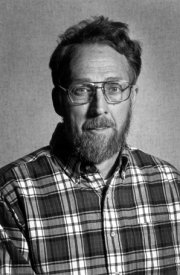We'll Always Remember that Smile
By DICK HILT, physics professor

Ed loved to cover his office door, the lab doors, or any available surface with inspirational quotes. One of his favorites was by Kathleen Norris: "Always (we have to) start by doing, and doing it wrong, making and unmaking, until, little by little, patiently persevering, (we) learn the trade while God looks on at (our) labor and humility, and works with (us)."
d Langerís triumphant "Ha!" no longer rings down the halls of Barnes. He died February 16 of a pulmonary embolism after beginning treatment for lymphoma. There are many things Iíll miss, but most of all that "Ha!" It wrapped up all the joy he got out of life.
Although Ed was a fresh Ph.D. when he arrived here in 1969, he had already taught for two years at Tuskegee University as a Woodrow Wilson teaching intern. He brought with him a passion for social justice, a remarkable mind, and an extraordinary love of teaching. He managed to inspire self-confidence in his students while setting high standards for them. "You can always find someone to tell you youíre not good enough," heíd say, "so donít bother yourself about that question; think about what you can do and how youíre going to do it!" Heíd then ask the right question to get them going.
Ed also loved sports, and said athletes were the easiest students to teach because they understand that practice and hard work make a better athlete (or student). Hereís a quote from his handout for the introductory course; it's vintage Langer:
...Learning physics does NOT mean memorizing a lot of "formulas" or typical problems.
It means thinking hard about a very few fundamental ideas, TRYING THEM OUT, LEARNING TO USE THEM IN YOUR OWN WAY, and seeing how they enable us to understand an enormous variety of things that happen in the world. If you learn to "do physics," you will be able to tackle problems that you have not seen before. Learning to see the general principles at work in the world is not easy and often requires a great deal of imagination. We, of course, think that itís worth the effort -- and even that it is a lot of fun...If he had not been a physics teacher he could have been a great coach.
With disheveled hair, rumpled sweater and hiking boots, Ed was a familiar figure on campus. The boots came off as soon as he got to the office, and he padded around in slippers or stocking feet for the rest of the day. He stayed shoeless even when demonstrating a way to move the earth: by jumping off a lab table. Ed had an aversion to ties, and thereís an apocryphal story that he wore one only for his wedding, his childrenís weddings, and some of their graduations.
When I served my time as chair of the department, Ed was my gentle Jeremiah, pointing out the things I had neglected when trying to solve departmental problems. He gave me other good advice, too: "Walk to school; it gives you time to think." He followed his own advice, not only walking to school, but also making thinking time by hiking up Waldo Canyon to the rock that was his "second office" somewhere near the top of the trail.
Ed spent his summers at the Lick Observatory of the University of California at Santa Cruz, often living in a tent at a campground to save money. He worked on the relative abundance of the elements in stars, and according to Bob Kraft, friend and frequent co-author, Ed made fundamental contributions to modern ideas about stellar nucleosynthesis. Over his career he authored or co-authored more than 50 papers, a publication record that is remarkable when you realize that Edís real love was teaching.
Physics major Tami Beitzel remembers him this way: "He was undoubtedly one of the best professors at this school. His excitement for physics was obvious in his teaching and in his life. One of his incredible traits was his love for the students. He cared and knew about every one of his students. I will always remember his big, happy smile."
So will we all.
Back to Index